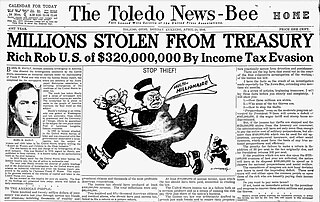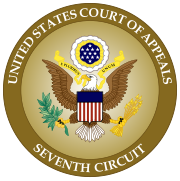
The United States of America has separate federal, state, and local governments with taxes imposed at each of these levels. Taxes are levied on income, payroll, property, sales, capital gains, dividends, imports, estates and gifts, as well as various fees. In 2020, taxes collected by federal, state, and local governments amounted to 25.5% of GDP, below the OECD average of 33.5% of GDP. The United States had the seventh-lowest tax revenue-to-GDP ratio among OECD countries in 2020, with a higher ratio than Mexico, Colombia, Chile, Ireland, Costa Rica, and Turkey.
Tax noncompliance is a range of activities that are unfavorable to a government's tax system. This may include tax avoidance, which is tax reduction by legal means, and tax evasion which is the criminal non-payment of tax liabilities. The use of the term "noncompliance" is used differently by different authors. Its most general use describes non-compliant behaviors with respect to different institutional rules resulting in what Edgar L. Feige calls unobserved economies. Non-compliance with fiscal rules of taxation gives rise to unreported income and a tax gap that Feige estimates to be in the neighborhood of $500 billion annually for the United States.
Although the actual definitions vary between jurisdictions, in general, a direct tax or income tax is a tax imposed upon a person or property as distinct from a tax imposed upon a transaction, which is described as an indirect tax. There is a distinction between direct and indirect tax depending on whether the tax payer is the actual taxpayer or if the amount of tax is supported by a third party, usually a client. The term may be used in economic and political analyses, but does not itself have any legal implications. However, in the United States, the term has special constitutional significance because of a provision in the U.S. Constitution that any direct taxes imposed by the national government be apportioned among the states on the basis of population. In the European Union direct taxation remains the sole responsibility of member states.
A gift tax or known originally as inheritance tax is a tax imposed on the transfer of ownership of property during the giver's life. The United States Internal Revenue Service says that a gift is "Any transfer to an individual, either directly or indirectly, where full compensation is not received in return."

Irwin Allen Schiff was an American libertarian and tax resistance advocate known for writing and promoting literature in which he argued that the income tax in the United States is illegal and unconstitutional. Judges in several civil and criminal cases ruled in favor of the federal government and against Schiff. As a result of these judicial rulings Schiff was in a hospital prison serving a sentence of 162 months at the time of his death at the age of 87. The Federal Bureau of Prisons reported that Schiff died on October 16, 2015.
Cheek v. United States, 498 U.S. 192 (1991), was a United States Supreme Court case in which the Court reversed the conviction of John L. Cheek, a tax protester, for willful failure to file tax returns and tax evasion. The Court held that an actual good-faith belief that one is not violating the tax law, based on a misunderstanding caused by the complexity of the tax law, negates willfulness, even if that belief is irrational or unreasonable. The Court also ruled that an actual belief that the tax law is invalid or unconstitutional is not a good faith belief based on a misunderstanding caused by the complexity of the tax law, and is not a defense.
A tax protester, in the United States, is a person who denies that he or she owes a tax based on the belief that the Constitution of the United States, statutes, or regulations do not empower the government to impose, assess or collect the tax. The tax protester may have no dispute with how the government spends its revenue. This differentiates a tax protester from a tax resister, who seeks to avoid paying a tax because the tax is being used for purposes with which the resister takes issue.
Section 61 of the Internal Revenue Code defines "gross income," the starting point for determining which items of income are taxable for federal income tax purposes in the United States. Section 61 states that "[e]xcept as otherwise provided in this subtitle, gross income means all income from whatever source derived [. .. ]". The United States Supreme Court has interpreted this to mean that Congress intended to express its full power to tax incomes to the extent that such taxation is permitted under Article I, Section 8, Clause 1 of the Constitution of the United States and under the Constitution's Sixteenth Amendment.
Old Colony Trust Co. v. Commissioner, 279 U.S. 716 (1929), was an income tax case before the Supreme Court of the United States.
Tax protesters in the United States have advanced a number of arguments asserting that the assessment and collection of the federal income tax violates statutes enacted by the United States Congress and signed into law by the President. Such arguments generally claim that certain statutes fail to create a duty to pay taxes, that such statutes do not impose the income tax on wages or other types of income claimed by the tax protesters, or that provisions within a given statute exempt the tax protesters from a duty to pay.
Tax protesters in the United States advance a number of conspiracy arguments asserting that Congress, the courts and various agencies within the federal government—primarily the Internal Revenue Service (IRS)—are involved in a deception deliberately designed to procure from individuals or entities their wealth or profits in contravention of law. Conspiracy arguments are distinct from, though related to, constitutional, statutory, and administrative arguments. Proponents of such arguments contend that all three branches of the United States government are working covertly to defraud the taxpayers of the United States through the illegal imposition, assessment and collection of a federal income tax.
Commissioner v. Duberstein, 363 U.S. 278 (1960), was a United States Supreme Court case from 1960 dealing with the exclusion of "the value of property acquired by gift" from the gross income of an income taxpayer.

Olk v. United States, 536 F.2d 876, 76-2 U.S. Tax Cas. (CCH) ¶ 9484, cert. denied, 429 U.S. 920, 97 S. Ct. 317 (1976), was a case decided before the United States Court of Appeals for the Ninth Circuit which dealt with the question of whether tips to casino dealers were taxable as income to the dealers under Internal Revenue Code section 61 or, alternatively, nontaxable gifts under Internal Revenue Code section 102(a).

Wolder v. Commissioner, 493 F.2d 608 the United States Court of Appeals for the Second Circuit decided whether 26 U.S.C. 102(a)'s exclusion of "bequests" from gross income included those made in consideration for services and whether the "detached and disinterested" standard applied to gifts made at death-time.
A tax protester is someone who refuses to pay a tax claiming that the tax laws are unconstitutional or otherwise invalid. Tax protesters are different from tax resisters, who refuse to pay taxes as a protest against a government or its policies, or a moral opposition to taxation in general, not out of a belief that the tax law itself is invalid. The United States has a large and organized culture of people who espouse such theories. Tax protesters also exist in other countries.
Tax protester arguments are arguments made by people, primarily in the United States, who contend that tax laws are unconstitutional or otherwise invalid.
Bogardus v. Commissioner, 302 U.S. 34 (1937), was a United States Supreme Court case discussing, under United States tax law, how to distinguish compensation from tax-exempt gifts under § 102(a). It is notable for the following holdings:

Poyner v. Commissioner 301 F.2d 287 is a United States tax law case that discusses whether "special death benefits" paid to an employee's widow are exempt from taxes as a gift under §102(a).

Stanton v. United States, 268 F.2d 727, was a United States income tax case in the United States Court of Appeals for the Second Circuit.

Under the federal law of the United States of America, tax evasion or tax fraud, is the purposeful illegal attempt of a taxpayer to evade assessment or payment of a tax imposed by Federal law. Conviction of tax evasion may result in fines and imprisonment. Compared to other countries, Americans are more likely to pay their taxes on time and law-abidingly.






